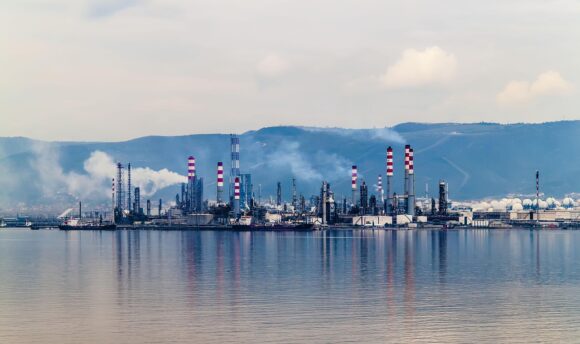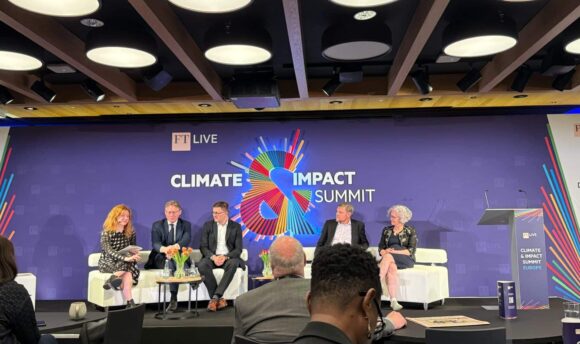A banner floated off the coast of Monaco, in front of the luxury hotel Fairmont where the major players of the reinsurance markets gather for a cocktail party at the 62nd Rendez-Vous de Septembre, a major industry event. It says “Reinsurers, Insure Our Future”.
Swiss Re, Munich Re, Hannover Re, SCOR and Berkshire Hathaway are the world’s five biggest reinsurance companies, with a combined 44% of global premiums in 2016. Together they have the power to hasten the phase-out of coal and play an important role in the fight against climate change.
Swiss Re leads this charge, no longer providing cover to coal projects and companies generating more than 30% of their revenues or power from coal. However, other reinsurers such as Hannover Re and Berkshire Hathaway have not restricted their cover to the climate-destroying coal sector at all. And as revealed by a new briefing from the Unfriend coal campaign, Reinsuring Climate Chaos, SCOR and Munich Re’s coal exclusion policies have major limitations and loopholes.
The UN recently called for a stop to all new coal plants and an accelerated phase-out of existing plants as a key step to meeting the Paris climate target of limiting global warming to below 2°C and as close to 1.5C as possible. Munich Re, SCOR, and all other reinsurers apart from Swiss Re, are failing to act accordingly and respond to the urgency of the situation.
Not only do existing coal projects mainly fall outside of the scope of their policies, but the measures taken do not even prevent them from backing, directly or indirectly, the building of new coal plants. Indeed, while SCOR’s policy only applies to new lignite plants, Munich Re’s announced measures may only apply to industrialized countries which account for less than 8% of new coal capacity planned or under construction.
Moreover, Munich Re and SCOR’s commitments only apply to contracts that cover a specific risk or defined package of risks, called facultative reinsurance; they do not apply to contracts where a reinsurer accepts all risk of a certain type from an insurance company, called treaty reinsurance. This loophole creates the risk that coal projects could continue to secure reinsurance by shifting from facultative to treaty contracts. Although Swiss Re says its policy applies across all business lines, it has not detailed how it applies to treaty reinsurance.
For example, in Poland, where 9 GW of new coal capacity is planned, most of the coal projects are directly insured by the local insurer PZU. But, PZU needs higher levels of reinsurance than major insurers to offset the legal, financial and natural risks of coal projects, which can run into billions of dollars. Without access to reinsurance, PZU may not be able to offer cover.
Considering Munich Re, Hannover Re and SCOR were named by PZU as three of its main reinsurers through treaty reinsurance in 2016 and/or 2017, it’s clear that ending direct reinsurance to coal only won’t be enough to stop backing coal expansion in Poland. Beyond Poland, more than 1200 new coal plants totaling around 630 GW of new coal capacity are currently in planning or under construction worldwide.
The reinsurers failure to act on this threat is not only a clear violation of the Paris Agreement but could also be considered a crime against humanity in the near future. Indeed, reinsurers are not only the ultimate managers of our society’s risk, but they have long been aware of the climate impacts we are experiencing today, and the worsening risks we will face in the coming years.
Reinsurers arrived in Monte-Carlo, a city-state known for its advantageous tax treatment, its luxury boats and its casinos, last Saturday. On the same day, tens of thousands of people took on the streets worldwide to call for climate action. As the Rendez-Vous de Septembre opens negotiations for the renewal of reinsurance treaties and reinsurers, we can hope the banner floating in front of their cocktail party will remind them the urgency to act. If they fail to do so, the Insure Our Future campaign will chase them wherever they go.




